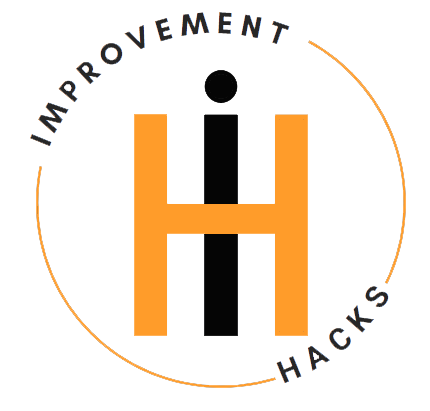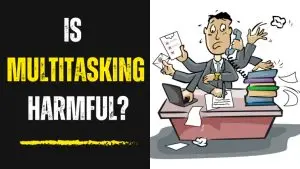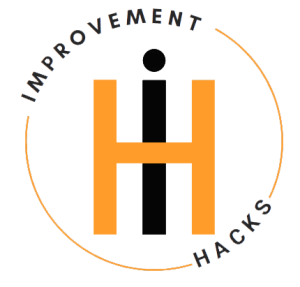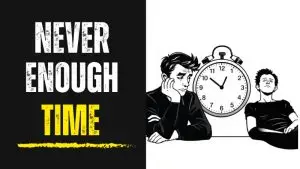The Truth About Multitasking and Its Impact on Your Productivity
Are you juggling multiple tasks at once, believing it makes you more productive?
Don’t worry, you’re not the only one.
Loads of people believe that multitasking is a superpower that allows them to get more done in less time.
But what if multitasking is actually slowing you down?
Multitasking means handling more than one task at the same time or quickly switching between tasks (Waller, 1997).
It may feel like an efficient way to tackle daily responsibilities, but is it really?
Research suggests that multitasking can actually reduce efficiency and increase making mistakes.
Let’s jump in and have a look at the science behind multitasking, what happens in your brain when you do it, and whether or not it’s truly an effective way to work.
So How Does Multitasking Work?
Imagine trying to cook dinner while answering emails and keeping an eye on a child.
Multitasking involves using different cognitive resources, such as vision, memory, and motor skills, to complete multiple tasks at once (Salvucci & Taatgen, 2008).
According to the threaded cognition theory, your brain allocates resources to each task separately.
When a task demands too many of the same resources, multitasking becomes difficult and less effective.
For example, if you are driving around an area you don’t know while trying to follow GPS directions, you are engaging in a load of cognitive functions at once.
You might think that you are managing ok, but your brain struggles to split focus between navigation and controlling the car.
This explains why some tasks seem to feel harder when they are combined.
What Happens in Your Brain When You Multitask?
Your brain may be a powerhouse, but even it has its limits.
Multitasking requires a lot of brainpower, mainly from the areas responsible for attention and self-regulation (Rothbart & Posner, 2015).
These brain functions help you resist distractions and switch between tasks effectively.
Studies show that people with higher intelligence and strong working memory perform better at multitasking (Colom et al., 2010).
However, even they have their limits.
Think of working memory like a mental notepad, it helps you keep track of different pieces of information at once.
If you have a strong working memory, you can hold onto different details and switch between tasks more effectively.
But for most people, multitasking increases mistakes and reduces focus (Colom et al., 2010).
When you try to do too many things at once, your brain struggles to keep up, leading to slower progress overall.
The Pros and Cons of Multitasking
Multitasking isn’t all bad, but then again, it’s not all good either.
Benefits:
- Some researchers believe multitasking can improve mental flexibility, especially in children (Watson & Strayer, 2010).
Being able to shift quickly between tasks may train the brain to adapt to changing situations more easily.
- Certain professions, such as waiting staff or emergency responders, require quick task switching, making multitasking a necessary skill (Fischer & Plessow, 2015).
In fast paced environments, the ability to manage multiple responsibilities at once can be beneficial. - Younger generations are more accustomed to media multitasking, which allows them to process multiple information sources efficiently (Rideout et al., 2010).
They’ve grown up in an age where constant information flow is the norm, and their brains have adapted accordingly.
Downsides:
- Think about the last time you tried to reply to a text while listening to an important conversation.
Multitasking reduces accuracy and increases errors, especially with complex tasks (Carrier et al., 2015).
Your brain isn’t designed to split focus equally between two demanding tasks. - It may weaken the ability to focus deeply on one thing at a time (Carr, 2020).
The more you train yourself to jump between tasks, the harder it becomes to sit down and focus on just one. - Over time, constant multitasking can make it harder to concentrate on single tasks, leading to lower productivity overall (Carrier et al., 2015).
If your brain is always shifting gears, it struggles to build momentum on any one task.
Surprising Facts About Multitasking
Here are some research-backed insights about multitasking:
- Have you ever found your mind wandering when trying to focus?
People who daydream or have wandering thoughts tend to be worse at multitasking (Ralph et al., 2014).
A distracted mind makes it even harder to juggle multiple tasks. - Multitasking might make you feel more productive, but studies show it lowers accuracy (Adler & Benbunan-Fich, 2012).
You might check more things off your list, but are you doing them well? - Different generations approach multitasking differently. Younger generations engage in more multitasking than older ones, particularly when it comes to digital media (Carrier et al., 2009).
This shift in habits suggests that media exposure plays a role in how we process tasks. - Not everyone struggles with multitasking.
Around 3% of the population can multitask efficiently without a drop in performance, while the other 97% experience reduced efficiency when trying to do multiple things at once (Watson & Strayer, 2010).
Unless you’re in that rare 3%, chances are multitasking is slowing you down.
Should You Stop Multitasking?
The reality is that multitasking is unavoidable in today’s fast-paced world.
From answering emails while on a call to listening to a podcast while working out, we are constantly splitting our attention.
But if you’re doing an important task that requires focus, try working on one thing at a time.
You may find that you finish tasks more quickly, make fewer mistakes, and feel less stressed.
Next time you catch yourself multitasking, pause for a moment.
Ask yourself: Does this task deserve my full attention?
If so, focus on it fully and see how much better you perform.
By understanding the real effects of multitasking, you can make better decisions about how to manage your time and energy.
So, is multitasking really helping you? Or is it holding you back?
Take a step back, focus on what matters, and work smarter—not harder.
References
● Adler, R. F., & Benbunan-Fich, R. (2012). Juggling on a high wire: Multitasking effects on performance. International Journal of Human-Computer Studies, 70(2), 156-168.
● Carr, N. (2020). The shallows: What the Internet is doing to our brains. WW Norton & Company.
● Carrier, L. M., Cheever, N. A., Rosen, L. D., Benitez, S., & Chang, J. (2009). Multitasking across generations: Multitasking choices and difficulty ratings in three generations of Americans. Computers in Human Behavior, 25(2), 483-489.
● Carrier, L. M., Rosen, L. D., Cheever, N. A., & Lim, A. F. (2015). Causes, effects, and practicalities of everyday multitasking. Developmental Review, 35, 64-78.
● Colom, R., Martínez-Molina, A., Shih, P. C., & Santacreu, J. (2010). Intelligence, working memory, and multitasking performance. Intelligence, 38(6), 543-551.
● Courage, M. L., Bakhtiar, A., Fitzpatrick, C., Kenny, S., & Brandeau, K. (2015). Growing up multitasking: The costs and benefits for cognitive development. Developmental Review, 35, 5-41.
● Fischer, R., & Plessow, F. (2015). Efficient multitasking: parallel versus serial processing of multiple tasks. Frontiers in Psychology, 6, 1366.
● Ralph, B. C., Thomson, D. R., Cheyne, J. A., & Smilek, D. (2014). Media multitasking and failures of attention in everyday life. Psychological Research, 78(5), 661-669.
● Rideout, V. J., Foehr, U. G., & Roberts, D. F. (2010). Generation M2: Media in the lives of 8-to 18-year-olds. Henry J. Kaiser Family Foundation.
● Rothbart, M. K., & Posner, M. I. (2015). The developing brain in a multitasking world. Developmental Review, 35, 42-63.
● Salvucci, D. D., & Taatgen, N. A. (2008). Threaded cognition: an integrated theory of concurrent multitasking. Psychological Review, 115(1), 101.
● Waller, M. J. (1997). Keeping the pins in the air: How work groups juggle multiple tasks. In M. M. Beyerlein & D. A. Johnson (Eds.), Advances in interdisciplinary studies of work teams (Vol. 4, pp. 217–247). Stamford, CT: JAI Press.
● Watson, J. M., & Strayer, D. L. (2010). Supertaskers: Profiles in extraordinary multitasking ability. Psychonomic Bulletin & Review, 17(4), 479-485.






